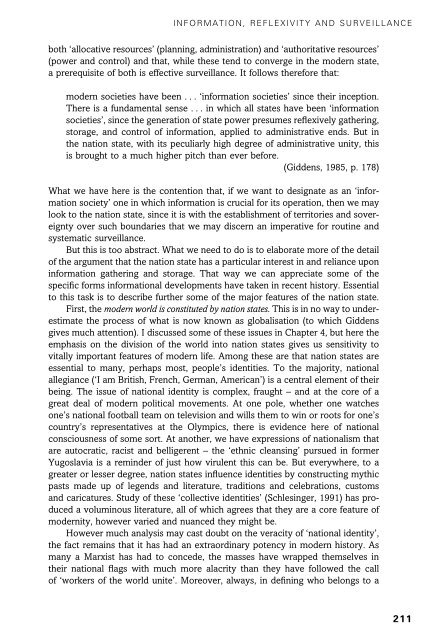Theories of the Information Society, Third Edition - Cryptome
Theories of the Information Society, Third Edition - Cryptome
Theories of the Information Society, Third Edition - Cryptome
You also want an ePaper? Increase the reach of your titles
YUMPU automatically turns print PDFs into web optimized ePapers that Google loves.
INFORMATION, REFLEXIVITY AND SURVEILLANCE<br />
1<br />
both ‘allocative resources’ (planning, administration) and ‘authoritative resources’<br />
(power and control) and that, while <strong>the</strong>se tend to converge in <strong>the</strong> modern state,<br />
a prerequisite <strong>of</strong> both is effective surveillance. It follows <strong>the</strong>refore that:<br />
modern societies have been . . . ‘information societies’ since <strong>the</strong>ir inception.<br />
There is a fundamental sense . . . in which all states have been ‘information<br />
societies’, since <strong>the</strong> generation <strong>of</strong> state power presumes reflexively ga<strong>the</strong>ring,<br />
storage, and control <strong>of</strong> information, applied to administrative ends. But in<br />
<strong>the</strong> nation state, with its peculiarly high degree <strong>of</strong> administrative unity, this<br />
is brought to a much higher pitch than ever before.<br />
(Giddens, 1985, p. 178)<br />
1<br />
1<br />
2<br />
1<br />
1<br />
What we have here is <strong>the</strong> contention that, if we want to designate as an ‘information<br />
society’ one in which information is crucial for its operation, <strong>the</strong>n we may<br />
look to <strong>the</strong> nation state, since it is with <strong>the</strong> establishment <strong>of</strong> territories and sovereignty<br />
over such boundaries that we may discern an imperative for routine and<br />
systematic surveillance.<br />
But this is too abstract. What we need to do is to elaborate more <strong>of</strong> <strong>the</strong> detail<br />
<strong>of</strong> <strong>the</strong> argument that <strong>the</strong> nation state has a particular interest in and reliance upon<br />
information ga<strong>the</strong>ring and storage. That way we can appreciate some <strong>of</strong> <strong>the</strong><br />
specific forms informational developments have taken in recent history. Essential<br />
to this task is to describe fur<strong>the</strong>r some <strong>of</strong> <strong>the</strong> major features <strong>of</strong> <strong>the</strong> nation state.<br />
First, <strong>the</strong> modern world is constituted by nation states. This is in no way to underestimate<br />
<strong>the</strong> process <strong>of</strong> what is now known as globalisation (to which Giddens<br />
gives much attention). I discussed some <strong>of</strong> <strong>the</strong>se issues in Chapter 4, but here <strong>the</strong><br />
emphasis on <strong>the</strong> division <strong>of</strong> <strong>the</strong> world into nation states gives us sensitivity to<br />
vitally important features <strong>of</strong> modern life. Among <strong>the</strong>se are that nation states are<br />
essential to many, perhaps most, people’s identities. To <strong>the</strong> majority, national<br />
allegiance (‘I am British, French, German, American’) is a central element <strong>of</strong> <strong>the</strong>ir<br />
being. The issue <strong>of</strong> national identity is complex, fraught – and at <strong>the</strong> core <strong>of</strong> a<br />
great deal <strong>of</strong> modern political movements. At one pole, whe<strong>the</strong>r one watches<br />
one’s national football team on television and wills <strong>the</strong>m to win or roots for one’s<br />
country’s representatives at <strong>the</strong> Olympics, <strong>the</strong>re is evidence here <strong>of</strong> national<br />
consciousness <strong>of</strong> some sort. At ano<strong>the</strong>r, we have expressions <strong>of</strong> nationalism that<br />
are autocratic, racist and belligerent – <strong>the</strong> ‘ethnic cleansing’ pursued in former<br />
Yugoslavia is a reminder <strong>of</strong> just how virulent this can be. But everywhere, to a<br />
greater or lesser degree, nation states influence identities by constructing mythic<br />
pasts made up <strong>of</strong> legends and literature, traditions and celebrations, customs<br />
and caricatures. Study <strong>of</strong> <strong>the</strong>se ‘collective identities’ (Schlesinger, 1991) has produced<br />
a voluminous literature, all <strong>of</strong> which agrees that <strong>the</strong>y are a core feature <strong>of</strong><br />
modernity, however varied and nuanced <strong>the</strong>y might be.<br />
However much analysis may cast doubt on <strong>the</strong> veracity <strong>of</strong> ‘national identity’,<br />
<strong>the</strong> fact remains that it has had an extraordinary potency in modern history. As<br />
many a Marxist has had to concede, <strong>the</strong> masses have wrapped <strong>the</strong>mselves in<br />
<strong>the</strong>ir national flags with much more alacrity than <strong>the</strong>y have followed <strong>the</strong> call<br />
<strong>of</strong> ‘workers <strong>of</strong> <strong>the</strong> world unite’. Moreover, always, in defining who belongs to a<br />
211
















